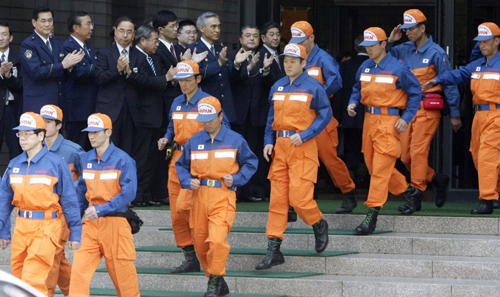Foreign rescuers battle for lives in China's quake zone
(Xinhua)
Updated: 2008-05-17 19:43
Updated: 2008-05-17 19:43
Qingchuan -- Foreign rescue teams have joined the front line in the battle to free those trapped after Monday's devastating earthquake in southwest China.
 A Japanese rescue team leaves the Metropolitan Police Department in Tokyo as they head for China to take part in relief efforts in areas hit by Monday's devastating earthquake, May 15, 2008. [Agencies] |
The second group of 29 Japanese earthquake rescuers joined their colleagues in Beichuan County, one of the worst hit areas in Sichuan Province, to continue rescue operations.
The first group of 31 well-equipped Japanese rescuers arrived at Qingchuan Friday afternoon before leaving for Beichuan.
With the help of fiber scopes, grabs and drilling equipment, they dug out the corpses of two victims, Song Aimei and her 70-day-old baby, from the debris of a dormitory after 16 hours of work.
They had found no signs of life in the building which belonged to the Qingchuan County Hospital of Chinese Traditional Medicine, according to a Xinhua reporter who witnessed the rescue work.
Takashi Koizumi, head of the Japanese team, expressed condolences, and said it's very pity not to find anyone alive.
Also in Sichuan, rescuers from the Republic of Korea (ROK) have recovered two bodies from the debris of the Hongda chemical plant in Yinghua township, of Shifang, where two chemical plants were destroyed in the earthquake, leaking 80 tons of ammonia and forcing more than 6,000 people to evacuate.
The ROK rescue team, with 41 members, arrived at Shifang at Saturday midnight with life detection equipment, breathing apparatus, gas masks and searching dogs.
"We will give 100 percent even if there is just one percent of hope," said the team head surnamed Kim, an experienced disaster relief worker.
Russian and Singaporean rescue teams are also at work in some of the worst hit areas.
Meanwhile, international emergency aid continued to flow into the quake zone.
A third batch of relief materials, including tents and food, is expected to arrive in Chengdu, Sichuan provincial capital, from Russia on Saturday afternoon. Russia had flown in 60 tons of humanitarian aid in two flights on Wednesday and Thursday, including tents and blankets.
Two military aircraft of Pakistan arrived in Chengdu on Friday evening, carrying tents, blankets, bottled water and medicines.
A planeload of humanitarian aid from the Singaporean government is expected to arrive in Chengdu on Saturday evening, including disinfectant tablets for drinking water, tents, stretchers, cutters, food and drinks.
French aid for China would arrive on Saturday evening by a chartered flight, including tents, sleeping bags, quilts and medicine cabinets.
Meanwhile, the Philippines is scheduled to deliver two batches of humanitarian aid to China consisting of blankets and bottled water. The first batch of materials would be transferred to the earthquake-hit areas on arrival on Saturday night.
Another plane of Spanish materials was to arrive on Saturday afternoon, with anti-inflammation pills such as penicillin and medical equipment, including respirators.
|
||
|
||
|
|
|
|

